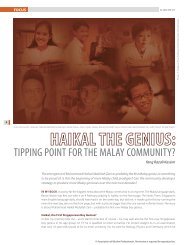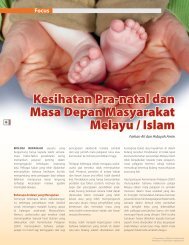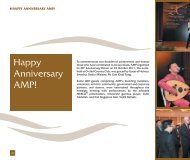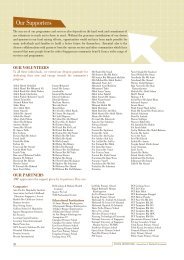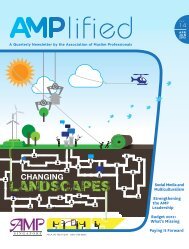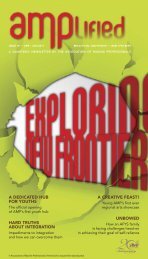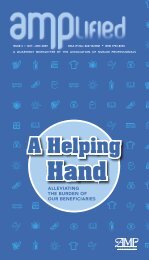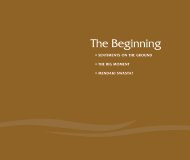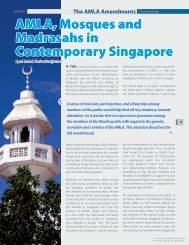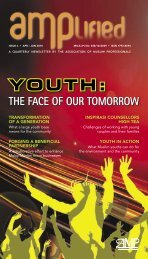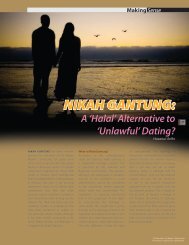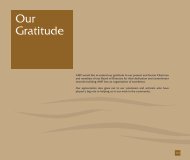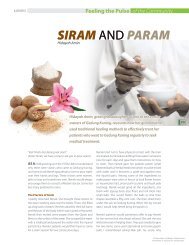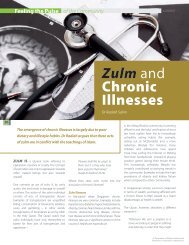community - Association of Muslim Professionals
community - Association of Muslim Professionals
community - Association of Muslim Professionals
You also want an ePaper? Increase the reach of your titles
YUMPU automatically turns print PDFs into web optimized ePapers that Google loves.
KARYAWAN<br />
FOCUS<br />
scored by sitting for the British equivalent <strong>of</strong> the GCE ‘A’ level examinations – the International General Certificate<br />
<strong>of</strong> Secondary Education (IGCSE). He sat for it last November when he was 12. When I was his age, I was in Primary<br />
6 trying hard to get into Secondary One; entering university did not even cross my mind. And the faculty he is<br />
aiming for? Medicine – because he wants to study the human brain. It is an acknowledgement <strong>of</strong> his brilliance that<br />
the National University <strong>of</strong> Singapore says it is seriously considering his application. In Singapore, the norm is that<br />
you don’t get into university until you are at least 18, or 21 if you did your National Service.<br />
Haikal’s sterling achievement takes a notch higher what appears to be a growing trend <strong>of</strong> Malays/<strong>Muslim</strong>s achieving<br />
exceptional peaks in education in recent years. Though few and far between, it is a positive trend nonetheless.<br />
A few years ago, Natasha Nabila Muhamad Nasir topped the Primary School Leaving Examination (PSLE) at 294<br />
points out <strong>of</strong> a possible 300. That was the highest PSLE score in 17 years, according to the Ministry <strong>of</strong> Education.<br />
The norm for the top scorers for PSLE has been in the region <strong>of</strong> the 280s. Breaking the 290 barrier was, beyond<br />
doubt, the dream <strong>of</strong> any Singaporean PSLE student. Who would have imagined that a Malay girl would achieve<br />
that – and by just six points short <strong>of</strong> a perfect score <strong>of</strong> 300. It will be tough to match her performance, though it<br />
will be matched or broken one day. Will that future record-breaker be another Malay student?<br />
Haikal the boy genius himself scored 274 points for his own PSLE, but that did not stop him from going on to<br />
strike out to achieve his dream. So what drove him to excel? Apparently, he decided to sit for the IGSCE to test<br />
his own ability after being inspired by another boy genius, Ainan Celeste Cawley. Ainan was the seven-year-old<br />
Singaporean boy with a Malay mother and British father who sat for the IGSCE for one subject – Chemistry – at ‘O’<br />
Level and passed.<br />
It is encouraging to note that Haikal is not alone as a child prodigy. According to The Straits Times, his sibling,<br />
Farhan, now a Primary 6 pupil at Rosyth, the same school as Haikal’s, also scored three A stars and one A in the<br />
IGSCE exams last year. Haikal and Farhan<br />
It is encouraging to note that Haikal is not<br />
alone as a child prodigy.<br />
come from a middle-class family. Their<br />
parents are both engineers; their mother<br />
was a civil engineer until she decided to be<br />
a housewife to dedicate her time fully to<br />
the family. So what’s their secret? Did they<br />
adopt any special study methods for their children? What inspiration did they give to their children to become so<br />
brilliant? Unfortunately, their parents seem to be shying away from the spotlight for now.<br />
5<br />
Malay Child Prodigies<br />
The sterling achievements <strong>of</strong> Haikal, Farhan, and Natasha Nabila, should make the Malay <strong>community</strong> proud,<br />
especially given the seemingly endless spate <strong>of</strong> disheartening news about low educational attainment within the<br />
<strong>community</strong>. When reports about Ainan first surfaced to become the youngest person in the world to pass the GCE<br />
‘O’ Level chemistry examination, the <strong>community</strong> was pleasantly surprised. While Ainan’s mother is Malay, his father<br />
is not. But Haikal and Farhan, like Natasha Nabila, do not come from mixed parentage. And there were quite a few<br />
more such child prodigies who came from pure Malay parentage. Another example is Muhammad Adib Surani,<br />
the former Raffles Institution mathematics genius who migrated to Australia with his parents five years ago and<br />
topped Australia in Mathematics for boys <strong>of</strong> his age. The Australian media described him as one <strong>of</strong> the top maths<br />
brains in Australia for his peer.<br />
Much earlier, in 1994, a Malay boy with an IQ <strong>of</strong> 172 entered junior college at 15 when the usual age is 17. Nazhar<br />
Adnan from Temasek Junior College was selected to join a space camp in the US organised by NASA – triggering in<br />
him an ambition to be an astronaut. Then, there was another source <strong>of</strong> pride, Dr Mansoor Jalil, the Cambridge PhD<br />
holder who had earlier graduated with First Class Honours in Physics. Indeed, decades earlier, before Singapore<br />
became a nation-state, Ahmad Ibrahim emerged as the first Singapore Malay student to score a double first class<br />
honours in law and economics from Cambridge in 1939. He later became a pillar in the Malay/<strong>Muslim</strong> <strong>community</strong><br />
as Singapore’s first Attorney General. He was also the brain behind the Administration <strong>of</strong> <strong>Muslim</strong> Law Act (AMLA)<br />
– that piece <strong>of</strong> legislation which till this day defines the legal superstructure governing the religious life <strong>of</strong> the<br />
Malay/<strong>Muslim</strong> <strong>community</strong> in Singapore. Pr<strong>of</strong>essor Ahmad Ibrahim later helped pioneer the growth <strong>of</strong> Islamic law<br />
in Malaysia, where he migrated to, when the International Islamic University was set up in the 1980s.<br />
© <strong>Association</strong> <strong>of</strong> <strong>Muslim</strong> Pr<strong>of</strong>essionals. Permission is required for reproduction.



